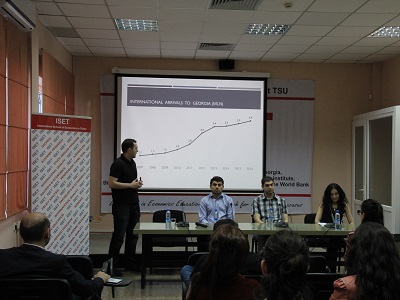Second year ISETers present tourism seminar
- Details

ISET second year students continued their series of policy seminars, this time focusing on the Georgian tourism sector. Shako Gobronidze, Diana Nersisyan, Robizon Razamadze, and Revaz Surguladze presented on the topic of seasonality, which both poses various challenges and grants opportunities for the Georgian tourism sector.
Seasonality affects the development of the tourism sector in several ways. By concentrating income generation within a limited timeframe, it creates a degree of uncertainty for investors, which could deter efforts to attract investments, especially for small tourism startups. Uneven demand due to seasonality also affects other businesses and sectors in the tourism supply chain, such as taxis, hotels, distribution, and agriculture. Finally, seasonality lowers the quality of service in the tourism sector, by giving fewer incentives to employers to train their staff or search for the best talent.
ISET, UNICEF and World Bank gather relevant stakeholders to urge further reforms in early and pre-school education systems in Georgia
- Details

Nobel-winning economist James Heckman proclaimed that “the data speaks for itself” after he carried out an experiment known as the 'Perry pre-School Project' and discovered that investing in high-quality preschool education brings returns of around 14 percent – a rate of return that is much higher than standard returns on stock market equity (7.2 percent).
Acknowledging the huge importance of pre-school education in human capital formation (as well as in shaping individuals’ moral views and their social preferences), ISET, in collaboration with UNICEF and the World Bank, organized a dialogue on “Early and pre-School Education: Current Challenges and the Way Forward” as part of the Education Policy Forum (EPF). The dialogue took place on May 10 in the ISET conference hall.










